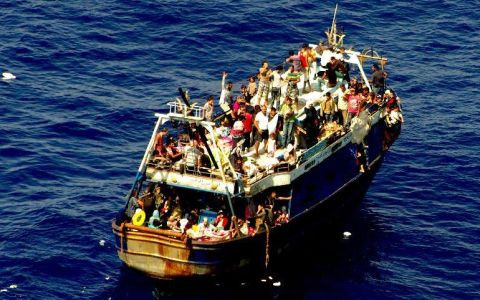IS fighters are on migrant boats entering Europe
Libyan government adviser Abdul Basit Haroun said smugglers were hiding IS fighters on boats filled with migrants.
European countries are struggling with the migration problem to prevent possible tragedies at sea and in the desert during the journey of people from some African countries seeking a better life in Europe.
This migration crisis not only brings worries about economic and social burdens, it is also putting Europe before security concerns, when Libyan officials warned on May 16 that many criminal organizations in the Mediterranean are bringing Islamic State fighters into Europe.
In an interview with the British BBC on May 16, Libyan government adviser Abdul Basit Haroun said that smugglers are hiding IS gunmen on boats filled with migrants, because European police cannot distinguish who is from IS and who is a regular refugee.
 |
| On boats full of migrants like this, there may be IS gunmen (photo: AFP) |
According to Mr. Haroun, this information is reliable because he has met with the owners of human trafficking boats in some areas of North Africa. IS also manipulates the owners of human trafficking boats, allowing them to operate but demanding that they cut 50% of the profits for each smuggling trip. On the boats, the rebel groups often sit separately and show no fear like other migrants. Libyan officials also warn that IS is planning to carry out attacks in Europe this year.
Since the beginning of the year, about 51,000 people have arrived in Europe by sea, of which 30,500 have passed through Italy.
About 1,800 people have died trying to cross the Mediterranean Sea to Europe. The International Organization for Migration recently warned that Europe will face humanitarian disasters not only at sea but also on land, as the number of African migrants crossing the Niger Desert to Europe could double to about 100,000 this year. The number of migrants who die in the desert could be similar to the number who die in the Mediterranean Sea.
“It is a difficult journey, with many stages,” said Giuseppe Loprete, head of the International Organization for Migration’s mission in Niger. “Many times migrants are physically and mentally abused. Their maps are confiscated by traffickers and they are robbed of their money. We are doing rescues at sea, but in the desert it is very difficult. It is a large area to cover. We do not have definitive statistics on how many people die in the desert, but we think it is bigger than the tragedy in the Mediterranean.”
The reception of migrants into Europe not only places an economic and social burden on the European Union member states, but is also creating internal disagreements and conflicts among countries regarding the sharing of responsibility for receiving migrants. The program for receiving migrants rescued in the Mediterranean Sea, announced by the European Commission on May 13, is expected to impose quotas to distribute the number of migrants applying for asylum to European countries, based on the GDP, population and unemployment rate of that country.
Accordingly, Germany, France and the UK will be the countries receiving the largest number of immigrants. French Prime Minister Manuel Valls on May 16 spoke out against the European Union (EU) plan. According to Prime Minister Valls, asylum is a right regulated by international standards and it is impossible to impose a quota on the number of people accepted as refugees, because it depends on whether immigrants apply for asylum or not.
Mr. Valls also emphasized that the reception of immigrants must be divided more fairly among member states: “I am against the establishment of refugee reception quotas. This is not in line with the French proposal. However, Europe must have an asylum policy and France is reforming its system to make it more effective. The bill is currently being discussed in the French Senate.”
The French Prime Minister also called on the EU to strengthen its border control system to prevent the increasingly serious illegal immigration. The UK also previously announced its opposition to the EU's plan to allocate quotas to member countries in receiving refugees./.
According to VOV.VN






